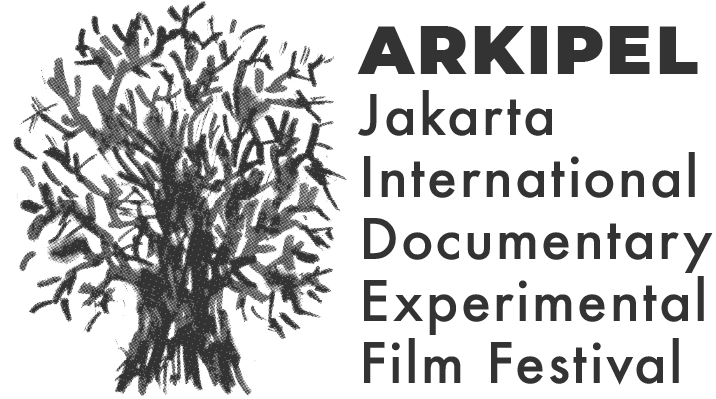Kamera yang Diancam dan Dimainkan
Penyelenggaraan ARKIPEL 2021 Twilight Zone – Jakarta International Documentary & Experimental Film Festival telah berlangsung selama sepekan. Pada Minggu, 5 Desember 2021, program Kompetisi Internasional 06: Sebuah Lokasi yang Kedatangan Tamu Asing disajikan di Bioskop Forum Lenteng pada sore hari. Program yang disajikan Pingkan Polla ini memutar dua filem; Flox (2019) dan Anak Merak (2019). Keduanya mengetengahkan posisi kamera di tengah masyarakat yang sedang disorotnya.
Flox disutradarai oleh Hady Mahmoud dari Mesir. Filem ini mengikuti sopir angkutan umum di sebuah stasiun di Kairo. Sekilas, situasi stasiun angkutan ini mirip dengan stasiun tradisional di Indonesia, yang biasanya dekat dengan pasar, kendaraan yang mulai lapuk, serta hiruk-pikuk supir dan kenek mencari penumpang. Selain mengikuti beberapa supir, kamera juga melihat situasi sekitar stasiun dengan mobil-mobil yang bertumpuk, cerita sopir yang tidak bersurat, dan peristiwa keos antar supir.
Sepintas, kamera seperti tidak berjarak dengan subjek yang ia rekam. Sopir-sopir itu tidak enggan untuk menceritakan kehidupannya yang keras dan ironi-ironinya di hadapan kamera dan orang-orang di lingkungan stasiun seperti tak acuh terhadap kamera. Meski demikian, pada suatu bagian, salah satu sopir memberitahu pembuat filem bahwa beberapa orang dari mereka mencurigai apa yang sedang dibingkai kamera.
Kecurigaan itu muncul ke permukaan pada bagian akhir. Seseorang di stasiun itu mengamuk, sesaat ia ikut menunjuk-nunjuk kamera agar tidak merekamnya. Kamera tetap menuju ke arah orang tersebut. Setelah orang itu mengancam, kamera pun turun menyorot kaki pemegang kamera dan filem berakhir.
Berbeda dengan bagaimana kamera diposisikan di filem kedua dalam program ini. Anak Merak disutradarai oleh Saleksa Srengenge dari Indonesia. Kamera menyorot sebuah desa di Taman Nasional Baluran, Jawa Timur. Setelah sibuk dengan lanskap alam di sekitar desa itu, kamera mengikuti kesibukan anak-anak di sekolah dan aktivitas harian mereka.
Kamera mulai mengintervensi kehidupan anak-anak tersebut. Salah satu anak memegang kamera dan merekam teman-temannya, sembari para kru filem mengajari anak tersebut untuk memakai kamera. Pada bagian selanjutnya, anak-anak diajak untuk membuat filem. Filem yang dirancang, direkam, dimainkan, dan ditonton oleh anak-anak tersebut.
Setelah pemutaran selesai, lampu dihidupkan. Penonton berangsur keluar meninggalkan tawa yang acap keluar saat adegan anak-anak mengadegankan filem mereka. Kami duduk di depan bioskop Forum Lenteng, di kursi panjang dan meja panjang. Sesekali menirukan irama dan dialog anak-anak dalam filem mereka.
Otty Widasari, Kepala Selektor ARKIPEL, berkomentar bahwa program ini memperlihatkan dinamika kamera dalam konteks sosialnya. Pada filem Flox, kamera disadari oleh subjek, kamera dianggap sebagai kawan dan ancaman oleh orang-orang yang direkam. Sementara, pada filem Anak Merak kamera dianggap sebagai mainan sekaligus memfasilitasi perspektif anak-anak tersebut tentang filem. Betapa bahagia masa kecil anak-anak itu.
Filem ini dapat ditonton di website Festival ARKIPEL hingga 11 Desember 2021.
Terjemahan Bahasa Inggris oleh Agatha Danastri Pertiwi
The Threatened and Played Camera
ARKIPEL 2021 Twilight Zone – Jakarta International Documentary & Experimental Film Festival has been held for a week. On Sunday, December 5, 2021, the International Competition 06: A Visit by A Foreign Guest was presented in the afternoon at Forum Lenteng Cinema. Presented by Pingkan Polla, there are two films shown in this program: Flox (2019) and Anak Merak (2019). Both films explore the position of the camera in the community it exposes.
Flox is directed by Hady Mahmoud from Egypt. This film follows a public transport driver at a station in Cairo. At first glance, the situation of this station is similar to traditional stations we have in Indonesia, which are usually close to the market, vehicles are starting to wear out, and the bustle of drivers looking for passengers. In addition to follow several drivers, the camera recorded the situation around the station with cars piled up, stories of undocumented drivers, and accidents between drivers.
At first glance, it feels like there’s no space between the camera and the recorded subject. The drivers are not reluctant to tell their harsh life and ironies in front of the camera, while the passengers or other people around them looks like they don’t care with the presence of the camera. However, at one point, one of the drivers told the filmmakers that some of them were suspicious of what the camera was framing.
Suspicion came up later in the end. Someone at the station spring into a rage, for a moment he also pointed at the camera, telling to not record anything. The camera is still pointing at the person. After the person threatens, the camera drops to the camera holder’s feet and the film ends.
It’s different from how the camera is positioned in the second film, Anak Merak, directed by Saleksa Srengenge from Indonesia. The camera focuses on a village in Baluran National Park, East Java. After being busy with the natural landscape around the village, the camera followed the childrens’ activities at school and their daily lives.
The camera begins to intervene in the children’s lives. One of the children holds the camera and records his friends, while the film crew teaches the children to use the camera. In the next part, the children are invited to make a film that are designed, recorded, played, and watched by themselves.
After the screening ended, the light was turned on. The audience gradually left, leaving laughter that often came out when the children were playing their films. We sat in front of the Forum Lenteng cinema, in long chairs and long tables. Occasionally imitating the rhythms and dialogues of children in their films.
Otty Widasari, Head Selector of ARKIPEL, commented that this program shows the dynamics of camera in its social context. In Flox, the camera is recognized by the subject, being considered a friend and a threat by the people being filmed. Meanwhile in Anak Merak, the camera is considered as a toy as well as facilitating the children’s perspective on the film. What a happy childhood.
This film can be watched on the ARKIPEL Festival website until December 11, 2021.



